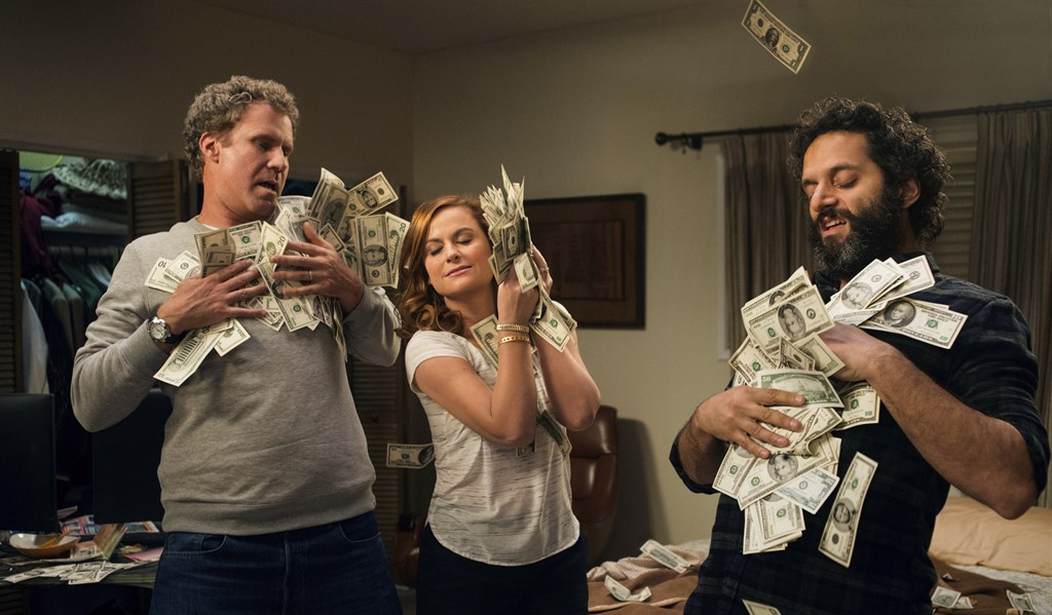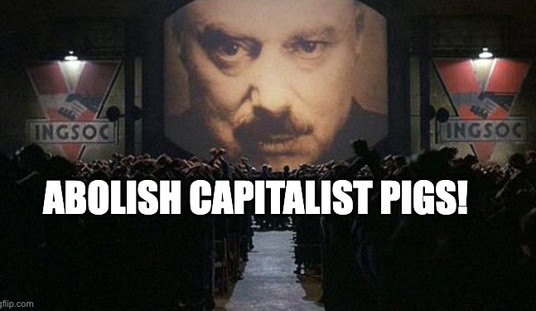What’s really behind the decline at the box office in 2017? Is it “franchise fatigue,” as the Hollywood Reporter predicted in May? Studios projected the year to end up near 2014’s nadir even before a bad stretch for some of Hollywood’s most anticipated releases followed. Christian Toto discovered that some media outlets think it might be more attributable to … Donald Trump. After The House, a highly promoted Will Ferrell-Amy Poehler vehicle, tanked on its debut, Variety started looking for answers:
Some studio execs have pointed to the growing role that Rotten Tomatoes plays in driving buzz on social media. A swath of negative or even mediocre reviews, the argument goes, could make a potential viewer reconsider buying a ticket, which is more expensive than ever. When looking at the movies that have underperformed this summer, the RT scores are middle of the road at best — “Snatched” (35%); “Baywatch” (20%); “Rough Night” (48%); and “The House” (16%). Compare that to comedies since “The Hangover” (79%) that have posted the highest earnings for R-rated comedies — “21 Jump Street” (85%) and its sequel (84%); “Bridesmaids” (90%); and “Neighbors” (73%). Another way of stating the theory: Movies that aren’t considered high-quality by critics tend to make less money.
But why aren’t critics and audiences pleased? Another point that’s been raised is that many of the scripts produced and released this summer were sold in a pre-Trump era. The definition of what makes a good comedy has changed quickly and dramatically in the past year. “Saturday Night Live” and late-night television have captured much of the comedy zeitgeist during and especially since the election — how are movies supposed to compete? Unlike a daily or weekly television show with a team of writers reacting to that day’s trending story, most movies spend years in development before hitting the big screen. Studios can only hope that the next big idea for what comedy means today is already in the works.
Not to be outdone, Deadline Hollywood also raised the specter of Trump:
But more than anything with comedy, it all comes down to timing. And studio executives believe that what Americans find funny now in the Trump era is quite different from what was hysterical during the Obama days.
Observes one distribution sage, “Ya know, by the time these movies are greenlit two years out, a lot can change in regards to the nation’s sense of humor by the time of release. And you can definitely say that plenty has changed in America in recent months.”
This mainly looks like the analytical equivalent of spitballing. Neither of these articles develop these conclusions in any serious manner, probably because it’s a highly unserious idea. Elections don’t change the country nearly as much as they reflect changes that have already taken place. These efforts feel more like a way to show that the writers are hip enough to name-check Trump as a bête noire for the industry, as well as an opening for the studios and the stars to avoid any blame for the debacles. To paraphrase a film with some original thought and writing: He becomes a myth, a spook story that studio heads, directors, and stars tell their kids at night. “Rate a film on Flixster, and Grumpy Trump will get you.” And no one ever really believes.
Toto scoffs at the argument, such as it is, calling it Trump Derangement Syndrome 101.
Who knew that comedy changed forever on Nov. 8, 2016? No longer can we enjoy classic romps like “Fletch,” “Blazing Saddles” and “Caddyshack.” We’re living in a new age, and the old comedy rules are out the door.
Sorry, Buster Keaton, Rodney Dangerfield and Gilda Radner. We’re now under the collective sway of Stephen Colbert and Bill Maher, men whose idea of humor is making oral sex jokes about the president.
How could a “Baywatch” or “House” compete with that brilliance?
In fact, Toto argues, perhaps the lesson from the election is that moviegoers have tired of lectures from “woke” stars and studios, especially since they get a steady diet of that already from television:
An even larger slice of the country would love a break from politics. Most movie goers aren’t dying to be wowed by political satire 24/7. They just want to laugh. Does Variety really think that after watching a half dozen late night shows delivering Trump gags for free we’ll pay to see variations thereof at the cineplex?
If Donald Trump’s not the problem, then … what is? David Sims has a straightforward explanation today at The Atlantic, which is that bad products don’t sell. While studios make other excuses, such as Trump or a supposed “Rotten Tomatoes effect,” the simple truth is that box office stinks because the films stink:
Laying blame at the feet of Rotten Tomatoes, and its increasingly essential “Tomatometer” (which measures the number of good and bad reviews each new release receives), has become the excuse du jour for anonymous studio executives. Rotten Tomatoes is supposedly whyThe House, a comedy that wasn’t even screened for critics, flopped. A few weeks ago, sources complained to Deadline about the underperformance of Pirates 5 and Baywatch, both of which were critically drubbed, claiming that “once upon a time these types of films — a family adventure and a raunchy R-rated comedy — were critic-proof.”
The sheer absurdity of this statement hinges on the use of “once upon a time.” In reality, once upon a time, Hollywood probably wouldn’t have bothered to make a fifth Pirates movie after the fourth entry, On Stranger Tides, grossed considerably less than the first three, and couldn’t even make up its (huge) budget at the domestic box office. Once upon a time, defunct TV properties like Baywatch weren’t considered safe bets to be turned into expensive summer tentpoles. Audiences didn’t avoid these films because they got bad reviews; they avoided them because they were never interested in them in the first place.
So let’s get this straight. Studios are blaming Rotten Tomatoes for … letting people know that movies stink ahead of time? Can’t wait for car manufacturers to blame the “Consumer Reports effect” for poor sales of lemons. Over the last several years, Hollywood studios have looked to China to make up for poor performance in domestic theaters. Sims warns that they’ve gone to the well too often, and are starting to come up dry there too:
But there are plenty of signs of trouble abroad. Transformers: The Last Knight indeed opened to a healthy $123 million in China, but that total collapsed by 75 percent in its second week. More and more, studios are flooding Chinese theaters on their films’ opening weekends to guarantee a huge initial take and offset disappointing numbers in the U.S. But Chinese audiences’ enthusiasm for that strategy appears to be waning (as a fascinating Hollywood Reporter look at the Chinese theater experience suggests). Hollywood studios are also partnering with major Chinese studios like Huahua Media and Wanda Film for these roll-outs; as such, their cuts of worldwide box-office numbers are getting smaller.
Meanwhile, in America, two of the biggest profit-makers of the year (Get Out and Split) were non-sequels made for low budgets by exciting directors (Jordan Peele and M. Night Shyamalan respectively). Last weekend, Edgar Wright’s Baby Driver, an original, R-rated heist thriller that got rave reviews, outperformed expectations, grossing $30 million (close to its total budget) in five days. The “specialty” release The Beguiled, only showing in 674 theaters, has made more money than The Mummy, which is still on 1,760 screens. Yes, there are big-budget follow-ups at the top of the year’s box-office charts, but those were all well-received. Audiences aren’t rejecting sequels; they just aren’t rushing to see re-treads of properties they’ve already lost interest in. And it’s still not clear if Hollywood is ready to take that message seriously.
Produce better films, get better box office. Any manufacturer that continually produces inferior and overpriced goods will eventually watch customers walk away. They walk away because consumers will eventually conclude that the producers don’t think much of their customers’ intelligence, and moviegoers have plenty of good reasons to suspect that’s exactly what Hollywood thinks of them.








Join the conversation as a VIP Member